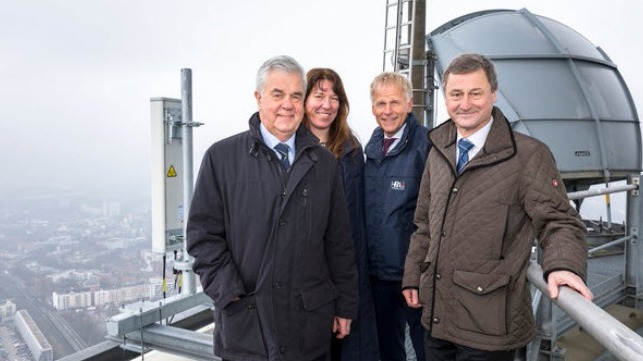Hamburg Trials 5G Communications

The Port of Hamburg is testing a 5G network that it says is set to transform communications.
5G is an entirely new network concept that combines terrestrial and mobile networks. Unlike technological advances of the past, which solely focused on increasing broadband width and speed, 5G will support a wide range of use cases that all have different speed, latency, security and capacity requirements. 5G will play an important role in new application scenarios created by the internet of things and Industry 4.0 - a name for the current trend of automation and data exchange in manufacturing technologies. It includes cyber-physical systems, the Internet of things, cloud computing and cognitive computing. Industry 4.0 creates what has been called a "smart factory." Besides the manufacturing industry, the logistics sector in particular is set to benefit from 5G mobile technology, says the port.
After six months of preparation the project partners - Hamburg Port Authority (HPA), Deutsche Telekom and Nokia - have now launched a testbed that stretches across some 8,000 hectares of port area. A base station has been installed on Hamburg’s television tower, over 150 meters (500 feet) in the air.
The testbed will test 5G applications in an industrial environment. Such networks must be ultra-reliable and highly secure as well as support multiple uses. The application needs of the Port of Hamburg are diverse, and the requirements on networks are particularly high. For instance, mobile networks will be relied on to co-ordinate traffic lights within the port area and to collect and process environmental data in real time. On top, virtual reality applications will be deployed to manage the infrastructure better and thus make it safer.
The 5G trial network is partitioned into virtual networks - so-called network slices - which are then customized to meet specific port application needs. For example, the separate virtual networks - or slices - support traffic light co-ordination and environmental data transmission. Network slicing in 5G networks delivers greater network flexibility and supports the port’s numerous and varied uses for the technology. The Port of Hamburg will be the first location in Germany where a network with several network slices will be tested under real life industrial conditions.
“5G offers a level of security, reliability and speed that current mobile networks are unable to match. It provides the HPA with a wholly new set of application options,” explains Jens Meier, CEO of the HPA. “The testbed allows us to study the future technology and co-shape the standard, which will not only benefit the port but the entire city of Hamburg.”
The trial forms part of the two-year 5G MoNArch research project (5G Mobile Network Architecture for diverse services, use cases, and applications in 5G and beyond). 5G MoNArch aims to put 5G mobile network architecture into practice by deploying 5G network slicing in real life test environments and use the insights gained to review and improve existing concepts. The testbed in Hamburg is primarily used to trial the integration of 5G into traffic and infrastructure management systems. As a 5G Infrastructure Public Private Partnership (5G-PPP) Phase II project 5G MoNArch is co-funded by Horizon 2020, the European Union’s Framework Programme for Research and Innovation.
